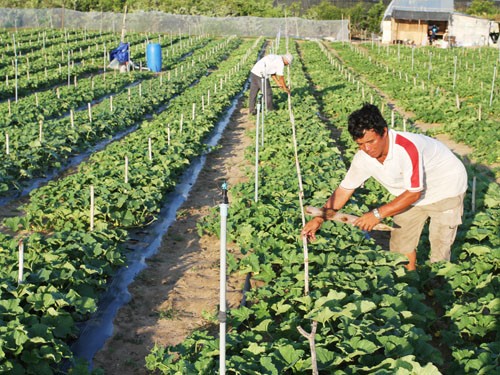(VOVworld) – The Steering Committee of the national target program on new rural development has carried out many programs to boost human resource training for building new rural areas, considering them a key to the program’s success. Training courses have given farmers the knowledge to increase their productivity and efficiency. VOV’s To Tuan has more……
 |
| Farmers of Tuan Tu commune in An Hai, Ninh Phuoc who have applied intensive farming techniques on growing cassada trees have resulted in high economic productivity. (Photo: Duy Anh) |
A Party resolution has affirmed that the development of agriculture, rural areas, and farmers is the basis for stabilizing the country’s politics in the national industrialization, modernization, and international integration process. Labor and agricultural restructuring plays an important role in creating breakthroughs in the agricultural sector and rural areas in Vietnam.
Realizing this, the government has set a goal from now until 2020 to provide training for 1 million rural laborers each year. Pham thi Hai Chuyen, Minister of Labor, Invalids, and Social Affairs, says ‘Vietnam has 51 million laborers, 36 million from rural areas. But most of them haven’t been trained. To restructure the national economy, labor restructuring is indispensable. The training should be prioritized to those whose land has been seized for agricultural or rural restructuring.’
The Vietnamese government considers skilled, trained laborers a key to the success of the national target program on new rural development. By 2020 the government hopes to increase training to generate stable jobs for about 70 to 80% of farmers, gradually shifting labor towards the production of goods. To realize this goal, Vietnam has spent more than 1.2 billion USD from the state budget for a vocational training program for rural labor. This year alone, 48 million USD has been allocated for training, 2.7 million USD for training commune-level officials, 14.4 million USD for farmers to attend vocational training programs, and 24 million USD to upgrade and equip vocational training centers. Le Huy Ngo, a former Minister of Agriculture and Rural Development, says ‘We should advise consult farmers on what they should grow, breed, and to whom they should sell their product? As a result, farmers will gain business and marketing knowledge.’
Cao Duc Phat, Minister of Agriculture and Rural Development, has emphasized training quality over quantity since the program was launched two years ago. He says ‘It’s important to define who should receive priority. Not everyone who registers for training programs can complete the training. Those who have attended the courses should apply what they have learned and use advanced production techniques effectively.’
The most practical lesson drawn from the program is that training should be related to farmers’ daily practice, and adapted to the conditions in each locality.
To Tuan